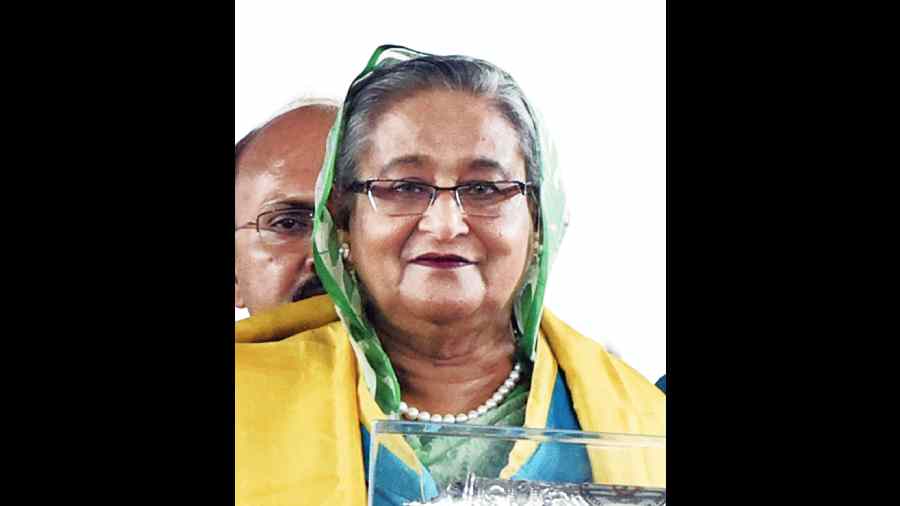
Hasina’s cattle observation stands in contrast to Delhi narrative
Don't Miss
Nowadays in our country we don’t depend on Indian cows much, says Bangladesh PM
Devadeep Purohit | TT | Calcutta | 05.09.22 : Prime Minister Sheikh Hasina has said that Bangladesh doesn’t depend “much” on Indian cattle these days, the statement coinciding with Indian central agencies’ investigation of several Trinamul leaders in Bengal in connection with alleged cattle smuggling to the eastern neighbour.
Hasina made the comment to Indian news agency ANI, which published the interview a day before she arrives in India on a four-day state visit, during which she will meet President Droupadi Murmu and Prime Minister Narendra Modi.
“Already, you know, nowadays in our country we don’t depend on Indian cows much. We are growing (rearing) our own, you know, cattle here because we need it,” Hasina said, responding to a question on the “increasing cattle smuggling in border areas”.
After the Modi government came to power in 2014, it banned cow export. It also intensified vigil along the India-Bangladesh border, the world’s fifth longest international border, which is riddled with gaps that were used to smuggle cattle from India to Bangladesh. Although the Centre has directed the border guards to stop cow smuggling, illegal cattle trade remains a hotly debated political issue in Bengal with the BJP alleging the racket is “increasing”, aided by Trinamul leaders.
Hasina said that cattle smuggling had reduced in recent years and would come down further.
“But some border smuggling takes place. So the two sides, the border forces, are sitting together. (When) any incident happens, they hold flag meetings, they discuss,” she said. “So, yes, we'll give the assurance that it will reduce.... They (India) should show some patience on the issue of cattle trafficking.”
Hasina’s advocacy of “patience” contrasts sharply with the alacrity with which the CBI and the ED have placed several senior Trinamul leaders — including party national general secretary Abhishek Banerjee — under the scanner on the issue. Last month, the CBI arrested Birbhum Trinamul president Anubrata Mondal for his alleged role in facilitating cross-border cattle smuggling. A political observer, seeking anonymity, said the BJP’s overdrive on cattle smuggling was part of its wider cow politics — a key strategy to bolster a divisive agenda in a country where the majority community considers the animal sacred.
“Their (BJP) leaders think the narrative of increased cow smuggling to Muslim-majority Bangladesh with Trinamul’s help will consolidate Hindu votes against Bengal’s ruling party,” the observer said.
“But when the Prime Minister of that country says publicly that they are not dependent on Indian cattle, it means there is something wrong in the (BJP) narrative.”
Multiple sources in Dhaka, including economists and senior government officials, said Hasina’s comment was based on facts available in the public domain.
“The 2014 (Indian) ban on cattle export did create a shortage in the (Bangladesh) market for some time and beef prices did increase by more than 30-40 per cent, but I think it has been a boon for us as it helped Bangladesh attain self-sufficiency,” said Ashikur Rahman, senior economist, Policy Research Institute, a Bangladeshi think tank.
“A large number of farmers and traders got involved in cattle rearing, and cattle production has witnessed a significant growth in recent times because of the demand.”
Data with the department of livestock services in Bangladesh corroborates Rahman’s assertion, showing that meat production rose from 45.21 lakh tonnes in 2013-2014 (just before the Indian export ban came into force) to 92.65 lakh tonnes in 2021-22. During the same period, milk production rose from 60.92 lakh tonnes to 130.75 lakh tonnes. International agencies have commented on these changes in the livestock economy of Bangladesh.
“Regarding beef production (in 2018), the government for the first time declared self-sufficiency in meat production with a production of 7.26 million metric tons (MT) against 7.21 million MT of demand,” a 2019 report by the United Nations Industrial Development Organisation said.Trinamul, which has been saying that any cattle smuggling should be blamed on the Centre whose forces guard the borders, seized on Hasina's comment.
“When the Bangladesh Prime Minister has purportedly come forward to stop cattle smuggling, India’s Union government should join hands with the neighbour to put a stop to the practice,” Trinamul national spokesperson and Rajya Sabha member Sukhendu Sekhar Roy said.
Samik Bhattacharya, the BJP’s chief spokesperson in Bengal, was defensive.“It’s true that cattle smuggling has fallen significantly on Modi's watch compared to UPA rule. However, it cannot be said that it has stopped completely,” he said.“The BSF acts whenever necessary, but without the help of the local administration, as in the case of Bengal, it’s very difficult to eradicate this menace.”


0 Response to "Hasina’s cattle observation stands in contrast to Delhi narrative"
Post a Comment
Disclaimer Note:
The views expressed in the articles published here are solely those of the author and do not necessarily reflect the official policy, position, or perspective of Kalimpong News or KalimNews. Kalimpong News and KalimNews disclaim all liability for the published or posted articles, news, and information and assume no responsibility for the accuracy or validity of the content.
Kalimpong News is a non-profit online news platform managed by KalimNews and operated under the Kalimpong Press Club.
Comment Policy:
We encourage respectful and constructive discussions. Please ensure decency while commenting and register with your email ID to participate.
Note: only a member of this blog may post a comment.